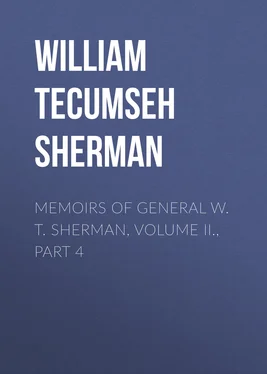William Tecumseh Sherman - Memoirs of General W. T. Sherman, Volume II., Part 4
Здесь есть возможность читать онлайн «William Tecumseh Sherman - Memoirs of General W. T. Sherman, Volume II., Part 4» — ознакомительный отрывок электронной книги совершенно бесплатно, а после прочтения отрывка купить полную версию. В некоторых случаях можно слушать аудио, скачать через торрент в формате fb2 и присутствует краткое содержание. Жанр: Биографии и Мемуары, История, foreign_edu, foreign_antique, foreign_prose, на английском языке. Описание произведения, (предисловие) а так же отзывы посетителей доступны на портале библиотеки ЛибКат.
- Название:Memoirs of General W. T. Sherman, Volume II., Part 4
- Автор:
- Жанр:
- Год:неизвестен
- ISBN:нет данных
- Рейтинг книги:5 / 5. Голосов: 1
-
Избранное:Добавить в избранное
- Отзывы:
-
Ваша оценка:
- 100
- 1
- 2
- 3
- 4
- 5
Memoirs of General W. T. Sherman, Volume II., Part 4: краткое содержание, описание и аннотация
Предлагаем к чтению аннотацию, описание, краткое содержание или предисловие (зависит от того, что написал сам автор книги «Memoirs of General W. T. Sherman, Volume II., Part 4»). Если вы не нашли необходимую информацию о книге — напишите в комментариях, мы постараемся отыскать её.
Memoirs of General W. T. Sherman, Volume II., Part 4 — читать онлайн ознакомительный отрывок
Ниже представлен текст книги, разбитый по страницам. Система сохранения места последней прочитанной страницы, позволяет с удобством читать онлайн бесплатно книгу «Memoirs of General W. T. Sherman, Volume II., Part 4», без необходимости каждый раз заново искать на чём Вы остановились. Поставьте закладку, и сможете в любой момент перейти на страницу, на которой закончили чтение.
Интервал:
Закладка:
General Howard soon reported by letter the operations of his right wing, which, on leaving Atlanta, had substantially followed the two roads toward Mason, by Jonesboro' and McDonough, and reached the Ocmulgee at Planters' Factory, which they crossed, by the aid of the pontoon-train, during the 18th and 19th of November. Thence, with the Seventeenth Corps (General Blair's) he (General Howard) had marched via Monticello toward Gordon, having dispatched Kilpatrick's cavalry, supported by the Fifteenth Corps (Osterhaus's), to feign on Mason. Kilpatrick met the enemy's cavalry about four miles out of Mason, and drove them rapidly back into the bridge-defenses held by infantry. Kilpatrick charged these, got inside the parapet, but could not hold it, and retired to his infantry supports, near Griswold Station. The Fifteenth Corps tore up the railroad-track eastward from Griswold, leaving Charles R. Wood's division behind as a rear-guard-one brigade of which was intrenched across the road, with some of Kilpatrick's cavalry on the flanks. On the 22d of November General G. W. Smith, with a division of troops, came out of Mason, attacked this brigade (Walcutt's) in position, and was handsomely repulsed and driven back into Mason. This brigade was in part armed with Spencer repeating-rifles, and its fire was so rapid that General Smith insists to this day that he encountered a whole division; but he is mistaken; he was beaten by one brigade (Walcutt's), and made no further effort to molest our operations from that direction. General Walcutt was wounded in the leg, and had to ride the rest of the distance to Savannah in a carriage.
Therefore, by the 23d, I was in Milledgeville with the left wing, and was in full communication with the right wing at Gordon. The people of Milledgeville remained at home, except the Governor (Brown), the State officers, and Legislature, who had ignominiously fled, in the utmost disorder and confusion; standing not on the order of their going, but going at once–some by rail, some by carriages, and many on foot. Some of the citizens who remained behind described this flight of the "brave and patriotic" Governor Brown. He had occupied a public building known as the "Governor's Mansion," and had hastily stripped it of carpets, curtains, and furniture of all sorts, which were removed to a train of freight-cars, which carried away these things–even the cabbages and vegetables from his kitchen and cellar–leaving behind muskets, ammunition, and the public archives. On arrival at Milledgeville I occupied the same public mansion, and was soon overwhelmed with appeals for protection. General Slocum had previously arrived with the Twentieth Corps, had taken up his quarters at the Milledgeville Hotel, established a good provost-guard, and excellent order was maintained. The most frantic appeals had been made by the Governor and Legislature for help from every quarter, and the people of the State had been called out en masse to resist and destroy the invaders of their homes and firesides. Even the prisoners and convicts of the penitentiary were released on condition of serving as soldiers, and the cadets were taken from their military college for the same purpose. These constituted a small battalion, under General Harry Wayne, a former officer of the United States Army, and son of the then Justice Wayne of the Supreme Court. But these hastily retreated east across the Oconee River, leaving us a good bridge, which we promptly secured.
At Milledgeville we found newspapers from all the South, and learned the consternation which had filled the Southern mind at our temerity; many charging that we were actually fleeing for our lives and seeking safety at the hands of our fleet on the sea-coast. All demanded that we should be assailed, "front, flank, and rear;" that provisions should be destroyed in advance, so that we would starve; that bridges should be burned, roads obstructed, and no mercy shown us. Judging from the tone of the Southern press of that day, the outside world must have supposed us ruined and lost. I give a few of these appeals as samples, which to-day must sound strange to the parties who made them:
Corinth, Mississippi, November 18, 1884.
To the People of Georgia:
Arise for the defense of your native soil! Rally around your patriotic Governor and gallant soldiers! Obstruct and destroy all the roads in Sherman's front, flank, and rear, and his army will soon starve in your midst. Be confident. Be resolute. Trust in an overruling Providence, and success will soon crown your efforts. I hasten to join you in the defense of your homes and firesides.
G. T. BEAUREGARD.
RICHMOND, November 18, 1884.
To the People of Georgia:
You have now the best opportunity ever yet presented to destroy the enemy. Put every thing at the disposal of our generals; remove all provisions from the path of the, invader, and put all obstructions in his path.
Every citizen with his gun, and every negro with his spade and axe, can do the work of a soldier. You can destroy the enemy by retarding his march.
Georgians, be firm! Act promptly, and fear not!
B. H. Hill, Senator.
I most cordially approve the above.
James A. SEDDON, Secretary of War.
Richmond, November 19,1864.
To the People of Georgia:
We have had a special conference with President Davis and the Secretary of War, and are able to assure you that they have done and are still doing all that can be done to meet the emergency that presses upon you. Let every man fly to arms! Remove your negroes, horses, cattle, and provisions from Sherman's army, and burn what you cannot carry. Burn all bridges, and block up the roads in his route. Assail the invader in front, flank, and rear, by night and by day. Let him have no rest.
JULIAN HARTRIDGE
MARK BLANDFORD,
J. H. ECHOLS
GEO. N. LESTER
JOHN T. SHUEMAKER
JAS. M. SMITH,
Members of Congress.
Of course, we were rather amused than alarmed at these threats, and made light of the feeble opposition offered to our progress. Some of the officers (in the spirit of mischief) gathered together in the vacant hall of Representatives, elected a Speaker, and constituted themselves the Legislature of the State of Georgia! A proposition was made to repeal the ordinance of secession, which was well debated, and resulted in its repeal by a fair vote! I was not present at these frolics, but heard of them at the time, and enjoyed the joke.
Meantime orders were made for the total destruction of the arsenal and its contents, and of such public buildings as could be easily converted to hostile uses. But little or no damage was done to private property, and General Slocum, with my approval, spared several mills, and many thousands of bales of cotton, taking what he knew to be worthless bonds, that the cotton should not be used for the Confederacy. Meantime the right wing continued its movement along the railroad toward Savannah, tearing up the track and destroying its iron. At the Oconee was met a feeble resistance from Harry Wayne's troops, but soon the pontoon-bridge was laid, and that wing crossed over. Gilpatrick's cavalry was brought into Milledgeville, and crossed the Oconee by the bridge near the town; and on the 23d I made the general orders for the next stage of the march as far as Millen. These were, substantially, for the right wing to follow the Savannah Railroad, by roads on its south; the left wing was to move to Sandersville, by Davisboro' and Louisville, while the cavalry was ordered by a circuit to the north, and to march rapidly for Millen, to rescue our prisoners of war confined there. The distance was about a hundred miles.
General Wheeler, with his division of rebel cavalry, had succeeded in getting ahead of us between Milledgeville and Augusta, and General P. J. Hardee had been dispatched by General Beauregard from Hood's army to oppose our progress directly in front. He had, however, brought with him no troops, but relied on his influence with the Georgians (of whose State he was a native) to arouse the people, and with them to annihilate Sherman's army!
Читать дальшеИнтервал:
Закладка:
Похожие книги на «Memoirs of General W. T. Sherman, Volume II., Part 4»
Представляем Вашему вниманию похожие книги на «Memoirs of General W. T. Sherman, Volume II., Part 4» списком для выбора. Мы отобрали схожую по названию и смыслу литературу в надежде предоставить читателям больше вариантов отыскать новые, интересные, ещё непрочитанные произведения.
Обсуждение, отзывы о книге «Memoirs of General W. T. Sherman, Volume II., Part 4» и просто собственные мнения читателей. Оставьте ваши комментарии, напишите, что Вы думаете о произведении, его смысле или главных героях. Укажите что конкретно понравилось, а что нет, и почему Вы так считаете.












